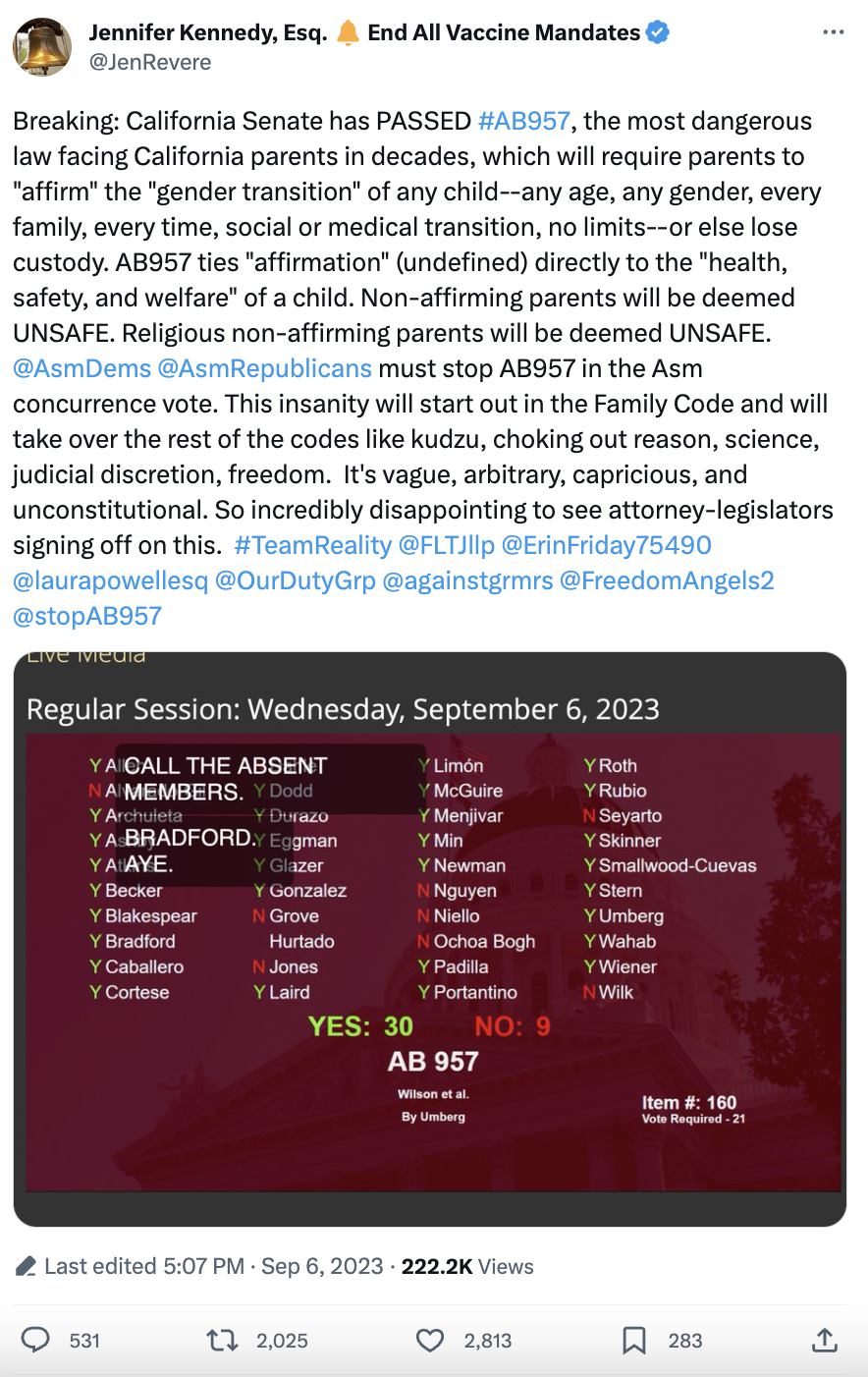
Will California legislative bill AB 957 require parents to affirm "gender transition" of any child or "lose custody"? No, that's not true: the bill would require judges in custody cases to consider a parent's affirmation of a child's gender identity as one of several components of "health, safety and welfare" determination already established in state law. The bill does not say, and does not mean, that a parent's affirmation (or not) of a child's gender identity would be decisive, or the only factor, in custody decisions, a legal expert told Lead Stories.
"The bill does not take someone's child away," Taylor Woolfork, chief of staff for Assemblywoman Lori Wilson, who sponsored the bill, told Lead Stories.
The claim appeared in a post published on X, formerly known as Twitter, on September 7, 2023 (archived here) which opened:
Breaking: California Senate has PASSED #AB957, the most dangerous law facing California parents in decades, which will require parents to "affirm" the "gender transition" of any child--any age, any gender, every family, every time, social or medical transition, no limits--or else lose custody.
This is what the post looked like on Twitter at the time of writing:
(Source: Twitter screenshot taken on Thu Sep 14 20:26:29 2023 UTC)
California lawmakers in both the state Senate and state Assembly approved AB 957 -- The TGI Youth Empowerment Act, which requires the governor's signature to become law -- that would instruct courts to consider, among many other factors, whether a parent affirms a child's gender identity when making custody and visitation decisions. It does not "force" parents to affirm the child's gender or lose custody.
"AB 957 only applies to child custody cases, where divorcing parents are unable to come to a custody agreement and find themselves in family court," Woolfork, Assemblywoman Wilson's chief of staff, told Lead Stories via email on September 13, 2023:
The bill simply adds a parent's affirmation of their child's gender identity as one factor among many that a judge should consider in a dispute. The bill does not take someone's child away. Judges have complete discretion on what the final agreement will look like. The bill also has nothing to do with gender-affirming surgery, which is a decision between the child, the parents and their medical provider.
Woolfork shared a Q&A fact sheet prepared by Wilson's office that addressed concerns about the bill, specifically about whether or not "courts be required to side with a parent that affirms their child's gender identity or gender expression." From the Q&A:
No. The bill does not compel a court to come to a particular conclusion based on thissingle factor or override the court's discretion to reach a determination about the child's best interest in light of all of the facts.
The fact sheet continues, noting:
In recognition of the clear connection between family acceptance and a child's overall well-being, AB 957 simply requires that, as part of a court's holistic consideration of the child's health, safety, and welfare, the court must also consider whether a parent affirms a child's gender identity or gender expression.
Jan C. Costello, professor emerita at Loyola Law School of Loyola Marymount University, who has expertise on the law and children, told Lead Stories via email on September 13, 2023, that the claim does not use the bill's actual language and "misrepresents how it will be applied in custody cases."
Costello explained that parents will "absolutely not" be forced to affirm the gender transition of their children or lose custody and noted the language of the bill says nothing about transition. It refers to "gender identity" or "gender expression." She wrote:
AB 597 does NOT "require of any child--any age, any gender, every family, every time, social or medical transition, no limits--or else lose custody."
Lead Stories asked Costello if all other factors are equal, would the bill then require that a parent that does not affirm their child's gender transition lose custody:
No, that is not how the court determines custody. The standard for determining custody is "best interests of the child (BIOC)." Health, welfare, and safety are factors which the court must consider along with any other relevant information. SB 597 just says that gender identity/gender expression falls under health. The bill does not define "affirm" but says that it will be "unique" to the individual child. Whatever form the "affirmation" takes, it must promote health, welfare and safety.
A state Senate analysis of the legislation notes that the bill does not force a decision based on just gender identity or gender expression:
This bill does not compel the court to come to a particular outcome based on this factor or override the court's discretion to reach a determination about the child's best interest in light of all of the facts; it merely makes explicit the fact that affirmance of a child's gender identity or gender expression is an important component of a child's overall health, safety, and welfare which should be considered by the family court.














